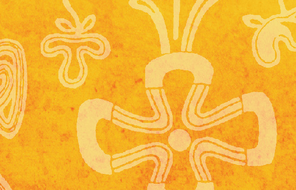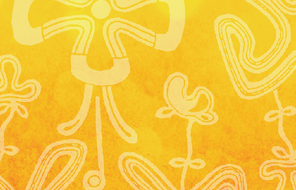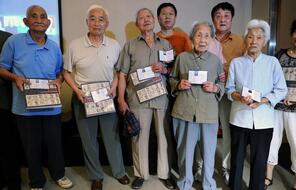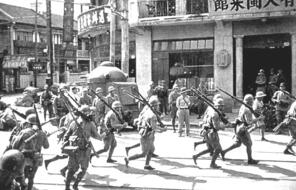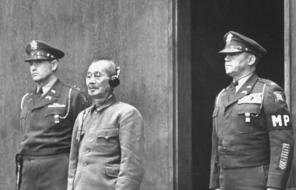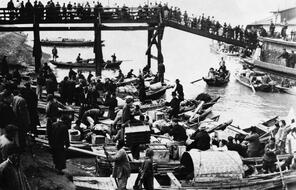Apology
At a Glance
Language
English — USSubject
- History
- Genocide
Over the years Japanese political leaders have issued a number of general apologies for the Imperial Army’s conduct during World War II. Despite these apologies, the Chinese people and Sino-Japanese relations have yet to be fully normalized, and tensions remain. Often the criticisms revolve around the actual language used by Japanese public figures to acknowledge the destruction and terror waged on behalf of their nation during World War II. What weight do different terms carry under such important circumstances? Are there different levels of responsibility expressed in using terms such as remorse versus apology?
The first Japanese prime minister to issue a public statement in regard to Japanese responsibility for war crimes committed in China was the 1972 statement made by Prime Minister Tanaka Kakuei to the people of the People’s Republic of China. 1 He said, “[We are] keenly conscious of the responsibility for the serious damage that Japan caused in the past to the Chinese people through war, and deeply reproaches itself.”
By the 1980s the frequency of public statements by Japanese political figures increased. In 1984 Emperor Hirohito said to President Chun Doo Hwan of South Korea during his visit to Tokyo, “It is indeed regrettable that there was an unfortunate past between us for a period in this century and I believe that it should not be repeated again.” 2 One year later at a speech given at the United Nations, Prime Minister Nakasone Yasuhiro said, “Since the end of the war, Japan has profoundly regretted the unleashing of rampant ultra nationalism and militarism and the war that brought great devastation to the people of many countries around the world and to our country as well.” 3
On the 50th anniversary of Japan’s surrender on August 15, 1995, Japanese prime minister Murayama Tomiichi offered a far more extensive official statement on this important anniversary.
The world has seen fifty years elapse since the war came to an end. Now, when I remember the many people both at home and abroad who fell victim to war, my heart is overwhelmed by a flood of emotions. . . .
Now that Japan has come to enjoy peace and abundance, we tend to overlook the pricelessness and blessings of peace. Our task is to convey to younger generations the horrors of war, so that we never repeat the errors in our history. . . . I will continue in all sincerity to do my utmost in efforts being made on the issues arisen from the war, in order to further strengthen the relations of trust between Japan and those countries.
Now, upon this historic occasion of the 50th anniversary of the war’s end, we should bear in mind that we must look into the past to learn from the lessons of history, and ensure that we do not stray from the path to the peace and prosperity of human society in the future.
During a certain period in the not too distant past, Japan, following a mistaken national policy, advanced along the road to war, only to ensnare the Japanese people in a fateful crisis, and, through its colonial rule and aggression, caused tremendous damage and suffering to the people of many countries, particularly to those of Asian nations. In the hope that no such mistake be made in the future, I regard, in a spirit of humility, these irrefutable facts of history, and express here once again my feelings of deep remorse and state my heartfelt apology. Allow me also to express my feelings of profound mourning for all victims, both at home and abroad, of that history.
Building from our deep remorse on this occasion of the 50th anniversary of the end of the war, Japan must eliminate self-righteous nationalism, promote international coordination as a responsible member of the international community and, thereby, advance the principles of peace and democracy. At the same time, as the only country to have experienced the devastation of atomic bombing, Japan, with a view to the ultimate elimination of nuclear weapons, must actively strive to further global disarmament in areas such as the strengthening of the nuclear non-proliferation regime. It is my conviction that in this way alone can Japan atone for its past and lay to rest the spirits of those who perished. 4
- 1Tanaka was drafted in 1937 and served in Manchuria during World War II, reaching the rank of senior private by 1940. One year later he contracted pneumonia and never re-enlisted.
- 2“Japan: Ritual of Reconciliation,” Time, September 17, 1984, accessed April 12, 2013.
- 3Times Wire Services, “In U.N. Speech, Japanese Leader Rejects Militarism: Nakasone Apologizes for WWII,” Los Angeles Times, October 24, 1985, accessed May 22, 2013.
- 4“Statement by Prime Minister Tomiichi Murayama ’On the Occasion of the 50th Anniversary of the War’s End’ (15 August 1995),” Ministry of Foreign Affairs of Japan website, accessed July 14, 2013.
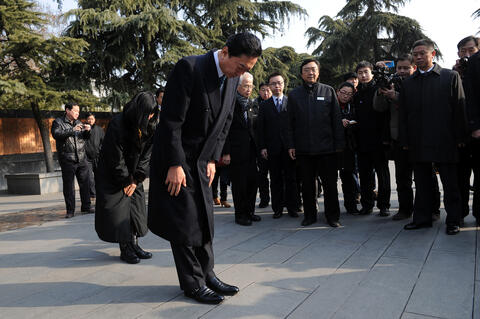
Former Japanese Prime Minister Hatoyama Yukio and his wife bow as they mourn for the Nanjing Massacre victims.
Three years later in 1998, Prime Minister Obuchi Keizo referenced two of these public statements in his declaration:
Both sides believe that squarely facing the past and correctly understanding history are the important foundation for further developing relations between Japan and China. The Japanese side observes the 1972 Joint Communique of the Government of Japan and the Government of the People’s Republic of China and the August 15, 1995 Statement by former Prime Minister Tomiichi Murayama. The Japanese side is keenly conscious of the responsibility for the serious distress and damage that Japan caused to the Chinese people through its aggression against China during a certain period in the past and expressed deep remorse for this. The Chinese side hopes that the Japanese side will learn lessons from the history and adhere to the path of peace and development. Based on this, both sides will develop long-standing relations of friendship. 5
Connection Questions
- In recent years there has been a lot of discussion about the power of apologies for historical wrongs. What role can apologies play as a means toward achieving justice? What are the limits of apologies? What else needs to happen?
- Compare the three public declarations included in this reading. Are there important differences between the statements issued by the Prime Ministers? How do they compare to the statement offered by Emperor Hirohito?
- Is it important for political leaders to acknowledge past wrongs and apologize for what occurred even if it cannot be undone?
- Think about an apology you have received and one that you have given. What did receiving an apology accomplish? What did offering an apology accomplish?
- 5“Japan-China Joint Declaration On Building a Partnership of Friendship and Cooperation for Peace and Development (26 November 1998),” Ministry of Foreign Affairs of Japan website, accessed May 14, 2013.
How to Cite This Reading
Facing History & Ourselves, “Apology," last updated March 14, 2016.
This reading contains text not authored by Facing History & Ourselves. See footnotes for source information.

